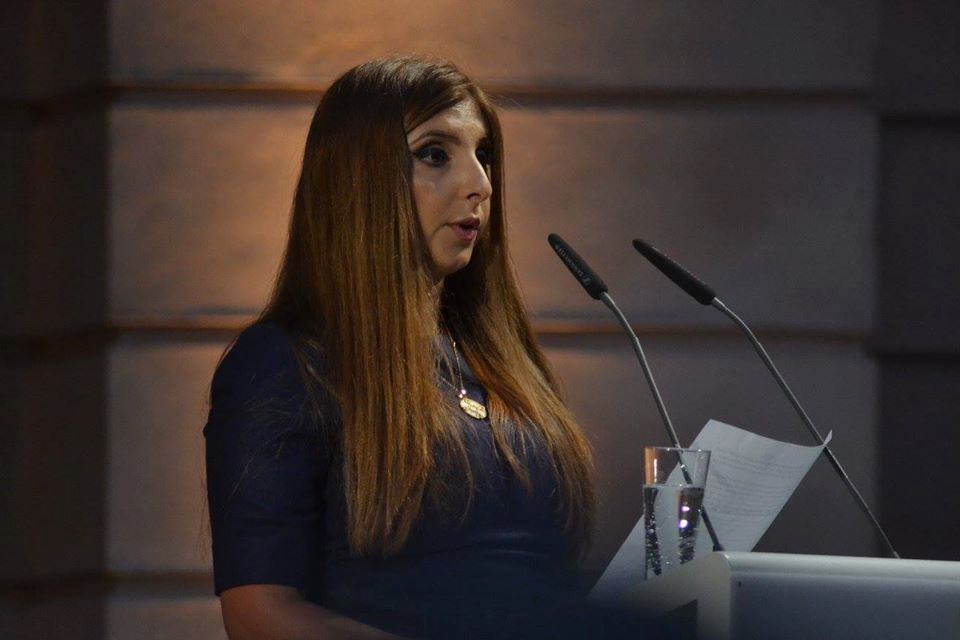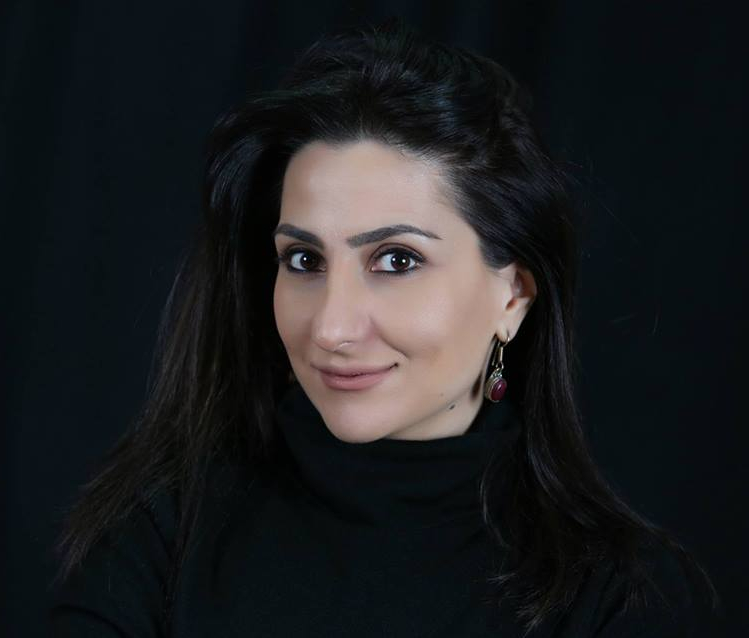by Sona Martirosyan
Every day, the forecourt of the Armenian Embassy in Germany gets suffused with sounds of the Gyumri dialect from 10 in the morning. Here, the refugees who were complete strangers several days ago, have became acquaintances because of the common problems – health issues and migration cards with red marks that showcase Germany’s unwillingness to further offer them shelter.

Berlin Cathedral, photo: Sona Martirosyan
Nuneh, a woman from Gyumri, came to Germany in 2016, after being diagnosed with a rare type of breast cancer and a subsequent mastectomy. She arrived here illegally with her husband and son’s family. They lived in a refugee camp for 11 months and then moved into a permanent building.
Nuneh’s brother had moved to Germany even earlier; he had experienced three clinical deaths in Armenian hospitals before leaving the country for good. Today, he is accompanying Nuneh to the consulate, where she will obtain a passport and return to homeland following the German authorities’ forced repatriation decision.
“My husband and I were given a room at a 4-storey dormitory. My son’s family lived in another room there. Each family received a monthly allowance of 520 Euros. Now they have increased the allowance to 720 Euros per month. We were perfectly capable of living on this, as all my treatments and surgeries are free, and there are special food stores, where you can go once a week and get everything you need only for one Euro. Obviously, they mainly sell slightly spoiled food that has exceeded or is about to go past its expiry date. But for me, it makes no difference if, for instance, I get a whole potato or with some cut-off damaged parts. The important thing is that the doctors in this country have saved my life. I have such a rare type of cancer that its samples were sent to the United States, so that medical students could examine them,” says Nuneh with tears in her eyes. She had to undergo another surgery several days ago. German doctors tried to remove another tumor, but it was impossible to completely get rid of it.
Nuneh awaits her return to Armenia with fear, as she has no money for further treatment, nor does she have any trust in local doctors.
“Here the professor [her doctor in attendance] knelt beside my bed, held my hand before the surgery, saying, ‘don’t be scared, it’ll be fine’. Can you imagine such a thing in Armenia? I have been a healthcare worker for 26 years and I don’t remember anything like this. I could not even locate Germany on the map before, but the people here accepted us, offered us shelter, and I started to pull round. There are medicaments that cost 1,500 Euros each. I have received six of them. How am I supposed to cover these expenses in Armenia? And now the court has ruled that I have no reason to stay here anymore, and I have to go back. Armenia demands that I return, so that to bury me there,” says the woman desperately.
She insists that she still loves her homeland, that the very thought of it brings tears to her eyes, particularly after being able to live in a country like Germany. Nuneh believes Armenia is still her homeland, but she wants to stay in Germany, she still wants to live.
How and why do Armenians travel to Germany?
In 2010-2018, 57,250 asylum requests from Armenian citizens were filed in the EU and EFTA (European Free Trade Association) countries. Overall, based on final decisions made in 2010-2018, some 1,080 Armenian citizens were granted refugee status, other 1,015 were given humanitarian protection status, and 880 citizens were granted auxiliary protection status. Germany, France, Austria and Belgium receive about 88% of Armenian asylum seekers annually.
As the statistics of the German Embassy in Armenia indicate, Germany issues highest number of visas to Armenians who want to travel to Schengen area countries. According to these figures, 14,942 visa applications were submitted by Armenian citizens, and the German Embassy issued 13,773 visas. Germany, however, remains a popular destination for illegal migrants as well.
Ani Dagesyan, board member of the Central Council of German-Armenians that represents the interests of German citizens of Armenian descent, says Armenians travel to Germany illegally for two main reasons: they either seek medical help or new life and opportunities. These two different categories of migrants have one thing in common: they all fall victim to false, incomplete or unverified information.
“The problem is that Armenians often fail to check the authenticity of the information they receive. They learn from their friends and relatives that Germany provides free treatment, or, for example, that it is possible to live a better life on benefits in Germany rather than by working in Armenia. These beliefs are absolutely wrong. Germany does not provide free medical care and cannot accommodate or grant a refugee status to all applicants,” says Dagesyan.
In order to obtain a medical visa to Germany, the applicant must have at least 20,000 Euros on a bank account to cover the expenses of medical examinations. The high cost of medical screenings prompts many people to travel to Germany illegally.
“Armenians mostly come to Germany with visas issued by three other European countries – the Czech Republic, Poland and Greece. After arriving here, they do everything to reach the German territory, sometimes even hiding in the back of a truck. When they finally do, they destroy their identity papers and apply for asylum or refugee status under fake names.
They mainly apply to obtain a refugee status under an assumed name, because they believe that this would make their deportation impossible. By law, before making a decision on deporting any person, the EU migration services first have to identify their citizenship”, Dagesyan adds.
The situation has changed: why does Germany deport Armenians?
According to the State Migration Service of Armenia’s Ministry of Territorial Administration and Development, 490 readmission requests for 944 Armenians were received from the EU countries in the first half of this year. The Service approved those for 792 persons. This means that the government has confirmed the Armenian citizenship of these persons, hence they are subject to forced repatriation. Most of Armenian citizens subject to readmission (576) are based in Germany; 97 live in France, 36 – in Sweden, 35 – in Austria and so on.
The expatriates are forcibly transported to Armenia by charter flights. This year, the increasing rate of deportations is linked to the Armenian Prime Minister Nikol Pashinyan’s statement, where he announced that Armenia’s population should reach five million by 2050. Meanwhile, official Yerevan and Berlin deny any backchannel talks at all levels.
Ani Dagesyan says the problem is not about backstage agreements, but the change in the political situation in both countries.
“After the Velvet Revolution, Armenia has changed its status. It is now considered a safe country, where there is no place for political, religious or racial discrimination. In this case, the German government is free to turn down asylum requests. As to those who arrive in Germany for treatment, it is important to understand that health services in Germany are not free of charge. And the law literally states that if a person enters Germany in a poor state of health, then he/she can leave the country in the same poor condition, with the sole exception of cases when a person’s return might directly lead to death,” explains Dagesyan, pointing out that right-wing political forces have been gaining momentum in Germany, and local people no longer want to pay for expensive treatment offered to foreign citizens.
“In order to size up the situation, we need to understand the positions of both sides. Yes, from the human perspective, it is extremely difficult to see our fellow countrymen in this situation, but we also need to understand German taxpayers, who are demanding that the government take action in response to growing migration flows. German Federal Office for Migration and Refugees maintains direct communication with Armenian Health Ministry and in cases where a disease is curable in Armenia, or the required medicaments or their analogues are available here, the patient is sent back to receive treatment in Armenia,” continues Dagesyan.

Ani Dagesyan says the problem is not about backstage agreements, but the change in the political situation in both countries. Photo: Ani Dagesyan’s Facebook page
If the process of granting or denying asylum lasted months or years before, today the issue is addressed within 1-2 days, followed by a relevant decision, adds Dagesyan, predicting a new wave of deportations in the near future.
“This is more about people who sought and received asylum on the grounds of political or religious intolerance under the former Armenian authorities. The status granted to a refugee is temporary; hence, a person receives protection as long as this is impossible in their own country. And when their country is capable of protecting these persons, the country that had offered shelter to such refugees, has to revise its commitment to protecting them,” she clarifies.
What should and what actually the deportees do
Ani Dagesyan, member of the board of the Central Council of German-Armenians, says the best solution for Armenian migrants in this situation could be voluntary return. In this case, the German government offers several support packages:
“If a person wishes to return to homeland voluntarily within 14 days after being denied asylum, he/she is eligible for certain benefits, up to a one-off pension amounting to 1,500 Euros per family member. This could be a considerable support to the people who had sold everything to come to Germany. However, our fellow countrymen rarely opt for this. They keep taking cue from others: they hire lawyers and decide to appeal the decision at the court of last resort. As a result, they spend their last money on legal proceedings and go back home completely broke. They often fall into the hands of Russian-speaking lawyers, who deceive our people, persuading them that a solution can be found to their problems, perfectly knowing that it is impossible,” Dagesyan notes.
Ashot Smbatyan, Armenian Ambassador to the Federal Republic of Germany, argues that the Armenian Embassy is able and willing to support with documentation and related issues only those Armenian citizens who return to their homeland voluntarily.
“As for the repatriation or deportation of Armenian citizens based on the decision of relevant German authorities within the framework of the Readmission Agreement signed between Armenia and the EU that came into effect in 2014, the Armenian Embassy is not authorized to interfere in the internal affairs of Germany. Under current German legislation, prior to deportation, the German authorities notify the persons subject to deportation in order to ensure their departure from Germany within the prescribed period. In the event of failure to comply with the deadlines, German authorities apply to other methods available within the scope of their jurisdiction,” the ambassador explains.
What does the homeland offer to the returnees?
In an attempt to provide reintegration support to the repatriates, the State Migration Service of Armenia has submitted for public hearings the draft State Primary Assistance Program for Reintegration of Citizens Returning to the Republic of Armenia.
The program offers support to the returnees in four main areas: it provides them with information assistance and temporary accommodation, offers referral for health care, as well as directs vulnerable groups to institutions that provide them with relevant care and support to meet their needs.
Citizens, who have returned to Armenia after at least one year of residing abroad, are eligible for the program in case they submit their applications within a maximum of three months after return. Around 13,680,000 Armenian drams will be allocated from the state budget for the implementation of the project.
This money will be used by the authorities to provide a six-month rental allowance to the repatriates in the amount of 60,000 drams (monthly). This type of support will be accessible only to 38 beneficiaries of the program that make up around 10% of the repatriates.
At the moment, two reintegration programs offer help to the returnees: “One Window”- a service that provides consulting and guidance to repatriates, and the European Return and Reintegration Network (ERRIN), which offers targeted assistance to returnees.
The project was launched in November 2018 and was intended for 400 beneficiaries, but due to an unexpectedly large flow of applicants, the project was implemented significantly earlier its deadline and was temporarily suspended until 2020. The ERRIN support package includes assistance for starting business, as well as offers professional retraining, medical examination and housing allowances for a period of six months.
Armenian authorities are optimistic that the involvement of international partners will give fresh impetus to the further realization of the project.
 Sona Martirosyan received her Masters Degree in journalism at Yerevan State University. She continued her education at the Yerevan School of Political Studies supported by the Council of Europe. For the last five years she has worked as a correspondent for several local and international news outlets. For the past nine years she has been the editor-in-chief of Aysor.am news portal. Sona has carried out projects in media literacy, protection of ethnic, religious and sexual minorities’ rights, women’s involvement in peacemaking processes and identity-based discrimination. Currently, she is the Spokesperson of the Minister of Labor and Social Affairs of Armenia.
Sona Martirosyan received her Masters Degree in journalism at Yerevan State University. She continued her education at the Yerevan School of Political Studies supported by the Council of Europe. For the last five years she has worked as a correspondent for several local and international news outlets. For the past nine years she has been the editor-in-chief of Aysor.am news portal. Sona has carried out projects in media literacy, protection of ethnic, religious and sexual minorities’ rights, women’s involvement in peacemaking processes and identity-based discrimination. Currently, she is the Spokesperson of the Minister of Labor and Social Affairs of Armenia.
